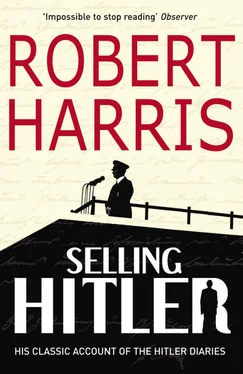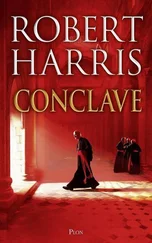Robert Harris
SELLING HITLER
This account is based upon interviews with the main participants in the Hitler diaries affair; upon the many hundreds of pages of prosecution evidence generated by the subsequent trial; and upon the so-called Stern Report – the findings of the internal commission set up by Stern to examine how the fiasco occurred. Almost all of this information came to me on the understanding that its various sources would not be identified publicly. It would be invidious to try to single out the few who did speak freely; I hope I shall be forgiven if I thank them here collectively rather than individually.
My editor at the BBC, David Dickinson, was once again extremely understanding. My colleague Jane Ellison collaborated on the research, from the first interview to the last document: without her help, this book could not have been written.
ROBERT HARRIS September 1985
Note
Most of the financial transactions concerning the Hitler diaries were conducted in Deutschmarks. In April 1983, when the diaries were published, the rates of exchange were:
£1 = 3.76 marks
$1 = 2.44 marks
Wilhelm Arndt: Adolf Hitler’s personal servant, entrusted with escorting the Führer’s ‘testament to posterity’ out of Berlin in April 1945
The Marquess of Bath: Owner of the world’s largest collection of Hitler’s paintings
Hans Baur: Hitler’s personal pilot
Randolph Braumann: ‘Congo Randy’, a close friend of Gerd Heidemann
William Broyles: Editor-in-chief of Newsweek
Gerda Christian:One of Hitler’s secretaries
Barbara Dickmann:Television journalist hired by Stern to help launch the Hitler diaries
Charles Douglas-Home:Editor of The Times
Manfred Fischer:Managing director of Gruner and Jahr, owners of Stern
Dr Max Frei-Sulzer: Swiss ‘handwriting expert’
Francois Genoud: Swiss lawyer representing the families of Hitler, Goebbels and Bormann
Frank Giles: Editor of the Sunday Times
Rolf Gillhausen: Stern editor
Otto Guensche: SS adjutant who burned Hitler’s body
Major Friedrich Gundlfinger: Luftwaffe pilot who flew Wilhelm Arndt out of Berlin in April 1945
Gerd Heidemann: Stern journalist responsible for obtaining the Hitler diaries
Gina Heidemann: Wife of Gerd Heidemann
Dr Josef Henke: Senior official of the West German Federal Archives
Dr Jan Hensmann: Deputy managing director of Gruner and Jahr
Peter Hess: Publishing director of Gruner and Jahr
Wolf Hess: Son of Rudolf Hess
Ordway Hilton: American ‘handwriting expert’
David Irving: British historian
Eberhard Jaeckel: Professor of History, University of Stuttgart
Medard Klapper: Arms dealer and confidence trickster who alleged he was in touch with Martin Bormann
Peter Koch: Stern editor
Peter Kuehsel: Financial director of Gruner and Jahr
Konrad Kujau: Forger of the Hitler diaries
Edith Lieblang: Konrad Kujau’s common law wife
Heinz Linge: Hitler’s valet
Brian MacArthur:Deputy editor, the Sunday Times
Werner Maser: West German historian
Rochus Misch: Führerbunker switchboard operator
Maria Modritsch: Konrad Kujau’s girlfriend
Reinhard Mohn:Chief executive, Bertelsmann AG
SS General Wilhelm Mohnke:Commander of the Führerbunker
Rupert Murdoch:Chairman, News International; owner, The Times, Sunday Times and New York Post
Henri Nannen:Founder and publisher of Stern
Lynn Nesbit:Senior Vice-President, International Creative Management
James O’Donnell:Author, The Berlin Bunker
Dr Klaus Oldenhage:Official of the West German Federal Archives
Maynard Parker:Editor of Newsweek
Leo Pesch:Journalist employed in Stern ’s history department
Billy F. Price:Collector of Hitler paintings from Houston, Texas; author, Adolf Hitler: The Unknown Artist
August Priesack:Self-styled ‘professor’ and expert on Hitler’s art, consulted by Fritz Stiefel and Billy Price
Kenneth Rendell:American ‘handwriting expert’
Arnold Rentz:West German forensic chemist
Felix Schmidt: Stern editor
Christa Schroeder:One of Hitler’s secretaries
Gerd Schulte-Hillen:Manfred Fischer’s successor as managing director of Gruner and Jahr
Richard Schulze-Kossens:One of Hitler’s SS adjutants
Wilfried Sorge:Member of the management of Gruner and Jahr, responsible for selling the Hitler diaries to foreign news organizations
Franz Spoegler: Former SS officer, who offered Heidemann forged correspondence between Churchill and Mussolini
Fritz Stiefel: Stuttgart businessman, collector of Nazi memorabilia
Jakob Tiefenthaeler: Collector of Nazi memorabilia who acted as agent for Gerd Heidemann when he tried to sell Goering’s yacht
Hugh Trevor-Roper(Lord Dacre of Glanton): Master of Peterhouse, Cambridge; Independent National Director, Times Newspapers
Thomas Walde: Head of Stern ’s history department
Gerhard Weinberg: Professor of Modern History, University of North Carolina
Peter Wickman: Stern correspondent based in London
Louis Wolfe: President, Bantam Books
SS General Karl Wolff: Heinrich Himmler’s Chief of Staff; Military Governor of northern Italy, 1943–45
ON APRIL FOOL’S Day 1983 the distinguished British historian Hugh Redwald Trevor-Roper, first Baron Dacre of Glanton, was telephoned at his country home in Scotland by the Assistant Editor of The Times , Mr Colin Webb.
Among his many honours, Trevor-Roper had, in 1974, accepted an invitation to become an Independent National Director of Times Newspapers. For nine years his telephone had rung periodically with news of strikes, sackings and closures. But this call had nothing to do with routine Times business. It concerned a discovery of great historical significance. It was strictly confidential. The German magazine Stern, said Mr Webb, had discovered the private diaries of Adolf Hitler.
Trevor-Roper, a former Regius Professor of History at Oxford, was startled and immediately sceptical. ‘I said to myself, there are so many forgeries circulating in the “grey market”: forged documents about Bormann, forged diaries of Eva Braun, falsified accounts of interviews with Hitler…’ Besides, it was well known that Hitler disliked putting pen to paper and had virtually given up writing in his own hand altogether after 1933. As far as he was aware there was no evidence, either in the German archives or in the recollections of Hitler’s subordinates, to suggest that the German dictator had kept a diary. If he had, and if it had now been discovered, it would certainly rank as one of the greatest historical finds of modern times: Hitler, as Trevor-Roper himself had written, was the twentieth century’s Genghis Khan, the ‘political genius’ whose murderous influence upon mankind was still being felt four decades after his death. If this diabolical figure, contrary to all accepted beliefs, turned out to have kept a diary , it would provoke a sensation.
Читать дальше












